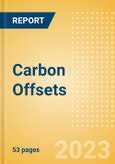Key Highlights
Regulators and standard-setters have become more skeptical of nature-based offsets, especially those that avoid emissions rather than remove existing emissions. While such offsets are cheap to buy (as low as $1 per ton of CO2), many offsets are unlikely to comply with emissions trading systems and cannot be used to meet emissions targets verified by the Science-Based Targets Initiative (SBTi).A small and growing number of companies are investing in technology-based carbon dioxide removal (CDR) projects such as biochar and direct air capture. These are more reliable when measuring the amount of carbon removed and have long-term storage capabilities. However, they are much more expensive (over $200 per ton of CO2) and have yet to scale, accounting for an estimated 3% to 5% of the offset market today with years-long wait times for delivery.
Scope
- This report provides an overview of carbon offsets, a major topic within the ESG theme.
- It includes a comprehensive introduction to carbon offsets and how they are used to offset greenhouse gas emissions.
- It includes a guide to corporate offset strategies and advice on how companies should approach carbon offsets.
- An appendix provides an overview of the carbon offsetting strategies of the largest 100 companies by market capitalization.
Reasons to Buy
- The number of carbon offsets issued climbed 359% to 291 million between 2015 and 2022.
- Demand for carbon offsets has been driven by some of the world’s largest companies incorporating them into their net-zero strategies.
- This report will help you understand more about carbon offsets and provide guidance on how to incorporate them into your net-zero strategy.
Table of Contents
- Executive Summary
- What Are Carbon Offsets?
- Corporate Carbon Offset Strategies
- When Carbon Offsets Go Wrong
- Most Companies Should Avoid Carbon Offsets
- Appendix: Carbon Offsetting Strategies of the Largest 100 Companies by Market Capitalization
- Glossary
- Thematic Research Methodology
- Contact the Publisher
Companies Mentioned (Partial List)
A selection of companies mentioned in this report includes, but is not limited to:
- Abbott Laboratories
- AbbVie
- Accenture
- Adobe
- Agricultural Bank of China
- Alibaba
- Alphabet
- Amazon
- AMD
- American Express
- Apple
- ASML
- AstraZeneca
- Bank of America
- Bank of China
- Berkshire Hathaway
- BHP Group
- Boeing
- Bristol-Myers Squibb
- Broadcom
- Caterpillar
- CATL
- Chevron
- China Construction Bank
- China Mobile
- Cisco
- Coca-Cola
- Comcast
- ConocoPhilips
- Costco
- Danaher
- Delta Air Lines
- Dior
- Disney
- Eli Lily
- ExxonMobil
- Hermes
- Home Depot
- Honeywell
- HSBC
- ICBC
- Intel
- Intuit
- Johnson & Johnson
- JP Morgan
- KLM
- Kweichow Moutai
- Leon
- Linde
- L'Oréal
- Lowe’s Companies
- LVMH
- Mastercard
- McDonald’s
- Merck
- Meta
- Microsoft
- Morgan Stanley
- Nestlé
- Netflix
- Nextera
- Nike
- Novartis
- Novo Nordisk
- NVIDIA
- Oracle
- Pepsico
- PetroChina
- Pfizer
- Procter & Gamble
- Prosus
- Qualcomm
- Raytheon Technologies
- Reliance Industries
- Roche
- Royal Bank of Canada
- S&P Global
- Salesforce
- Samsung
- Sanofi
- SAP
- Saudi Aramco
- Shell
- Siemens
- South Pole
- Tata Consultancy
- Tencent
- Tesla
- Texas Instruments
- Thermo Fisher Scientific
- T-Mobile US
- TotalEnergies
- Toyota
- TSMC
- Unilever
- Union Pacific Corporation
- United Parcel service
- UnitedHealth
- Verizon
- Verra
- Visa
- Walmart
- Walt Disney
- Wells Fargo








